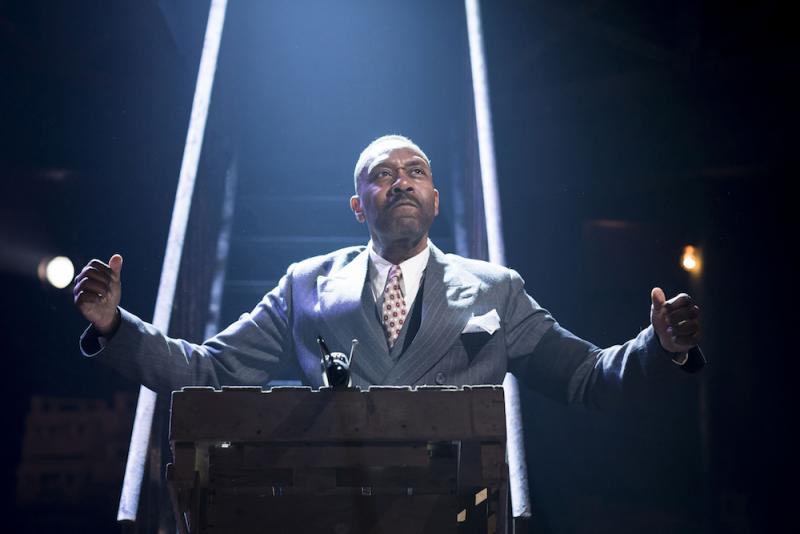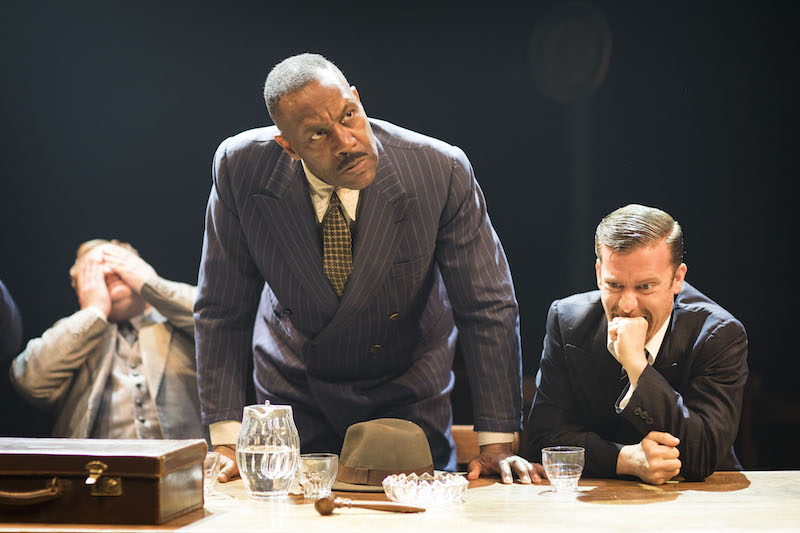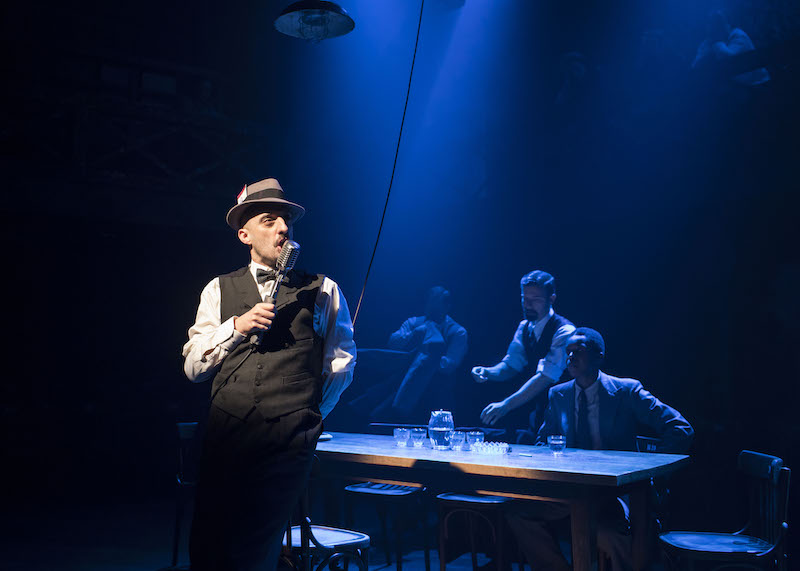The Resistible Rise of Arturo Ui review - 'Lenny Henry covers Trump's greatest hits' | reviews, news & interviews
The Resistible Rise of Arturo Ui review - 'Lenny Henry covers Trump's greatest hits'
The Resistible Rise of Arturo Ui review - 'Lenny Henry covers Trump's greatest hits'
The Donmar Warehouse targets a modern monster via Brecht's Hitler satire

It’s a bigly Trump-fest over at the Donmar, with adaptor Bruce Norris determined to make Brecht great again – or at least pointedly contemporary.
All the Trump greatest hits are here, covered by Lenny Henry (pictured below with Simon Holland Roberts and Philip Cumbus) in the title role, from “nasty woman”, “losers”, “paid protestors” and “I have all the best words” to the law and order platform characterised by buzzwords “crime”, “immigrants” and “wall”. Plus a thin-skinned fixation on media coverage, glaring conflicts of interest and obsession with winning. Subtle it is not.  The immediacy is physical too, with the theatre’s stage-level bank of seats removed to create a sultry speakeasy in which the actors can prowl the audience and (you have been warned) draw unsuspecting spectators into the drama. Kudos on press night to – in particular – the cheery corpse and the game if bewildered chap placed on trial. But, as the conclusion hammers home, we are all on trial here: if we don’t actively object, we are complicit.
The immediacy is physical too, with the theatre’s stage-level bank of seats removed to create a sultry speakeasy in which the actors can prowl the audience and (you have been warned) draw unsuspecting spectators into the drama. Kudos on press night to – in particular – the cheery corpse and the game if bewildered chap placed on trial. But, as the conclusion hammers home, we are all on trial here: if we don’t actively object, we are complicit.
Brecht’s 1941 play borrows from Shakespeare and the glamorised American gangster movie in his allegorical portrait of the rise of Hitler. Arturo Ui (Henry) is a small-time mobster who muscles in on the Chicago cauliflower business, eventually “annexing” nearby territories as well. This rise – springing, it is suggested, from unchecked, morally vacant capitalism – may well have been preventable.
Norris’s Trump jibes don’t match the specificity and accuracy of Brecht’s German paralleling; nor, arguably, does this immature autocrat-wannabe deserve the suggestion that he’s capable of such coherent plotting. The barrage of explicit – rather than theatrically allusive – references to The Donald becomes a tad wearying, and is likely unnecessary when the staging of this play in 2017 is a such clear statement in itself. Simon Evans’s buoyant cabaret-style production, with husky jazz covers of pop songs and sultry styling from Peter McKintosh, is certainly engaging – and a good reflection of the politics as entertainment trend that birthed the first reality TV President. The standout scene is Henry’s slouched, shambling Arturo learning a more impressive physicality in order to emerge as a leader: a mincing walk that tips into goose-stepping, a Nazi salute lowered into imposing folded arms, and the rhetorical tricks and accompanying gestures borrowed from an actor’s rendition of Mark Antony’s famous oration.
Simon Evans’s buoyant cabaret-style production, with husky jazz covers of pop songs and sultry styling from Peter McKintosh, is certainly engaging – and a good reflection of the politics as entertainment trend that birthed the first reality TV President. The standout scene is Henry’s slouched, shambling Arturo learning a more impressive physicality in order to emerge as a leader: a mincing walk that tips into goose-stepping, a Nazi salute lowered into imposing folded arms, and the rhetorical tricks and accompanying gestures borrowed from an actor’s rendition of Mark Antony’s famous oration.
Henry effectively navigates the transition from low-level thug, pouting when his name disappears from the paper, to menacing manipulator and finally untouchable commander. His earlier Arturo occasionally strays into The Simpsons’ Fat Tony territory, as he has a little too much fun with the gangster archetype, but his assured physical work is purposeful – as when he waddles astride a chair in order to scoot it intimidatingly close to someone. If his final turn isn’t as chilling as it might be, that’s perhaps more a symptom of the giddy, Trump-saturated framing than Henry’s portrayal.
Tom Edden (pictured above) leans firmly into that riotousness, offering not one but two show-stealing turns: a flamboyant journalist ecstatically reporting the blood-splattered drama, and a soused, old-fashioned thesp whose wild gesticulations are amplified by his cane and swirling cape. Michael Pennington provides a necessary counterweight as the alderman seduced into corruption and left frail and hollow in futile remorse; likewise Justine Mitchell maintains the impassioned voice of the moral opposition, even as the court case in which her dogged defence lawyer fights becomes a breathless farce. Yet the latter scene is symptomatic of a production that winds up more comedy roast than true horror.
rating
Explore topics
Share this article
The future of Arts Journalism
You can stop theartsdesk.com closing!
We urgently need financing to survive. Our fundraising drive has thus far raised £49,000 but we need to reach £100,000 or we will be forced to close. Please contribute here: https://gofund.me/c3f6033d
And if you can forward this information to anyone who might assist, we’d be grateful.

Subscribe to theartsdesk.com
Thank you for continuing to read our work on theartsdesk.com. For unlimited access to every article in its entirety, including our archive of more than 15,000 pieces, we're asking for £5 per month or £40 per year. We feel it's a very good deal, and hope you do too.
To take a subscription now simply click here.
And if you're looking for that extra gift for a friend or family member, why not treat them to a theartsdesk.com gift subscription?
more Theatre
 Hedda, Orange Tree Theatre review - a monument reimagined, perhaps even improved
Scandinavian masterpiece transplanted into a London reeling from the ravages of war and the inexorable march of post-colonialism
Hedda, Orange Tree Theatre review - a monument reimagined, perhaps even improved
Scandinavian masterpiece transplanted into a London reeling from the ravages of war and the inexorable march of post-colonialism
 The Assembled Parties, Hampstead review - a rarity, a well-made play delivered straight
Witty but poignant tribute to the strength of family ties as all around disintegrates
The Assembled Parties, Hampstead review - a rarity, a well-made play delivered straight
Witty but poignant tribute to the strength of family ties as all around disintegrates
 Mary Page Marlowe, Old Vic review - a starry portrait of a splintered life
Tracy Letts's Off Broadway play makes a shimmeringly powerful London debut
Mary Page Marlowe, Old Vic review - a starry portrait of a splintered life
Tracy Letts's Off Broadway play makes a shimmeringly powerful London debut
 Little Brother, Soho Theatre review - light, bright but emotionally true
This Verity Bargate Award-winning dramedy is entertaining as well as thought provoking
Little Brother, Soho Theatre review - light, bright but emotionally true
This Verity Bargate Award-winning dramedy is entertaining as well as thought provoking
 The Unbelievers, Royal Court Theatre - grimly compelling, powerfully performed
Nick Payne's new play is amongst his best
The Unbelievers, Royal Court Theatre - grimly compelling, powerfully performed
Nick Payne's new play is amongst his best
 The Maids, Donmar Warehouse review - vibrant cast lost in a spectacular-looking fever dream
Kip Williams revises Genet, with little gained in the update except eye-popping visuals
The Maids, Donmar Warehouse review - vibrant cast lost in a spectacular-looking fever dream
Kip Williams revises Genet, with little gained in the update except eye-popping visuals
 Ragdoll, Jermyn Street Theatre review - compelling and emotionally truthful
Katherine Moar returns with a Patty Hearst-inspired follow up to her debut hit 'Farm Hall'
Ragdoll, Jermyn Street Theatre review - compelling and emotionally truthful
Katherine Moar returns with a Patty Hearst-inspired follow up to her debut hit 'Farm Hall'
 Troilus and Cressida, Globe Theatre review - a 'problem play' with added problems
Raucous and carnivalesque, but also ugly and incomprehensible
Troilus and Cressida, Globe Theatre review - a 'problem play' with added problems
Raucous and carnivalesque, but also ugly and incomprehensible
 Clarkston, Trafalgar Theatre review - two lads on a road to nowhere
Netflix star, Joe Locke, is the selling point of a production that needs one
Clarkston, Trafalgar Theatre review - two lads on a road to nowhere
Netflix star, Joe Locke, is the selling point of a production that needs one
 Ghost Stories, Peacock Theatre review - spirited staging but short on scares
Impressive spectacle saves an ageing show in an unsuitable venue
Ghost Stories, Peacock Theatre review - spirited staging but short on scares
Impressive spectacle saves an ageing show in an unsuitable venue
 Hamlet, National Theatre review - turning tragedy to comedy is no joke
Hiran Abeyeskera’s childlike prince falls flat in a mixed production
Hamlet, National Theatre review - turning tragedy to comedy is no joke
Hiran Abeyeskera’s childlike prince falls flat in a mixed production
 Rohtko, Barbican review - postmodern meditation on fake and authentic art is less than the sum of its parts
Łukasz Twarkowski's production dazzles without illuminating
Rohtko, Barbican review - postmodern meditation on fake and authentic art is less than the sum of its parts
Łukasz Twarkowski's production dazzles without illuminating

Add comment